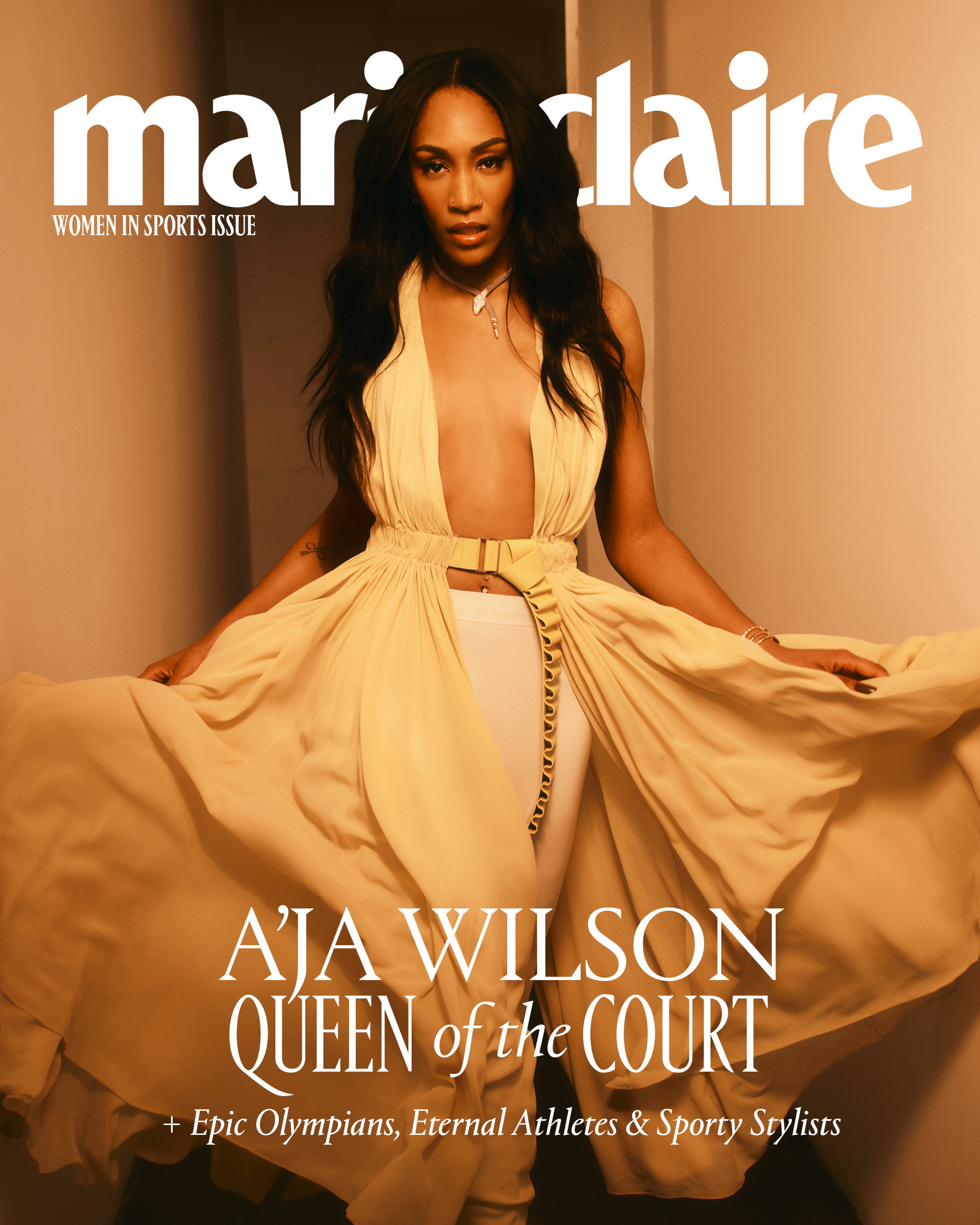A’ja Wilson Is Still Reaching New Heights
She’s been leading the WNBA for years. But now, with the sport seeing unprecedented growth, the basketball superstar opens up about what it means to have all eyes on you.
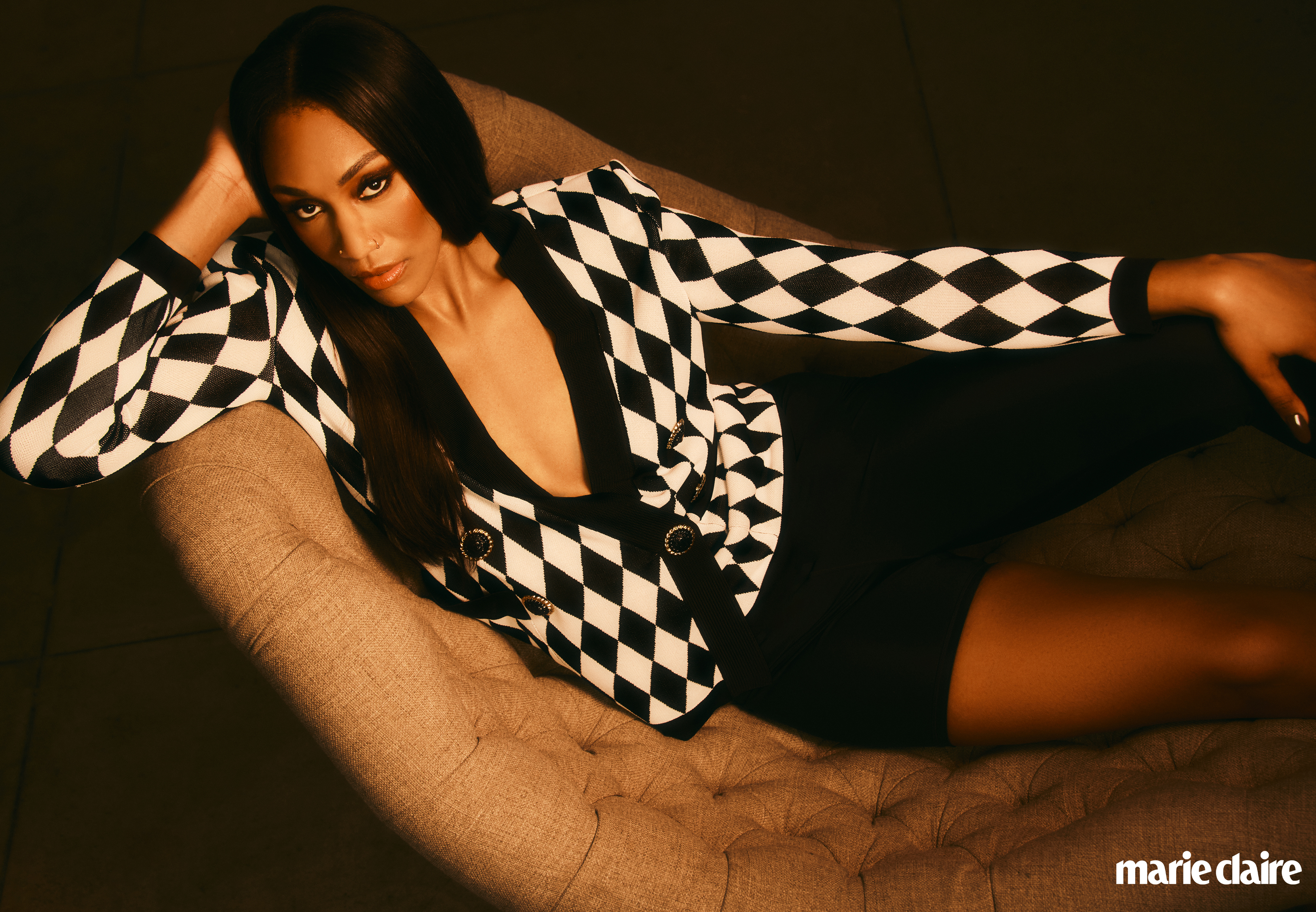
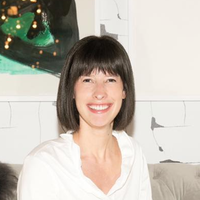
At Michelob Ultra Arena, home of the Las Vegas Aces, her aura precedes her. It’s over an hour until tip-off, there are people wearing A’ja Wilson jerseys, everywhere. In the stands, a sea of signs: “I WANT TO BE THE NEXT A’JA!” “I GOT MARRIED LAST NIGHT AND ALL I WANT FOR MY HONEYMOON IS AN A’JA AUTOGRAPH!” “THIS IS MY FIRST A’JA WILSON GAME!” When Wilson eventually appears—not physically, just on the Jumbotron—the crowd erupts. One woman jumps up so quickly to cheer she spills her nachos. On her nails, No. 22 painted in glittery silver polish.
Sitting in front of me, a tween girl wearing a “WNBA We Love To See Us Win” T-shirt and pink sneakers, holds her phone in the air, ready to snap a photo of her “favorite player” when she comes running onto the court. Wilson, she tells me, is the reason she hoops and rolls her basketball shorts just so.
And then it happens. The lights go low, then start strobing and flashing. Flames shoot out of the backboards on each end of the court, as the announcer summons the Aces to the floor. When Wilson runs out, the thunderclaps of the crowd reach a new octave.
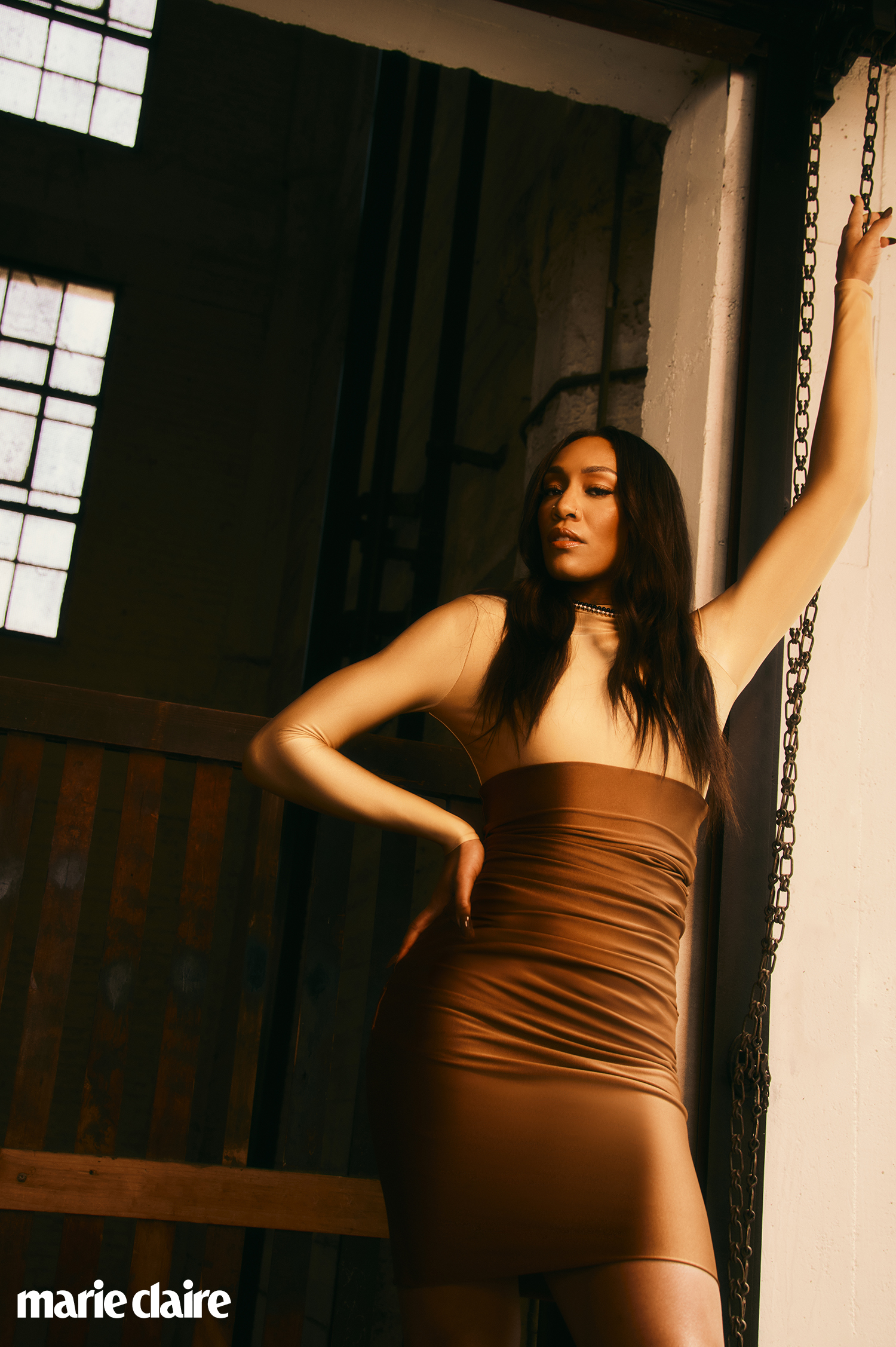
Sportmax top and skirt; Cartier jewelry
The scene is a reflection of something remarkable that’s happening in the WNBA (or the W as fans of the league often call it): a wildly-growing fanbase. While the league has been around since 1997, in the last few years interest has seemed to grow exponentially. According to StubHub, ticket sales have jumped up 93 percent since last season. Almost 2.5 million viewers tuned into the WNBA draft this spring on ESPN, which was up 307 percent from the previous record high set in 2004. Teams like the Aces saw season ticket sell-outs; that was a first.
When the Aces faced off against the New York Liberty in mid-June—a re-match of last year’s championship face-off in which the Aces took home the win—they set a new regular season franchise record with over 10,000 people in attendance. But a few weeks later, that record had already been broken. In early July, at a game versus the Indiana Fever, there were over 20,000 people in the seats, making it the highest regular season single-game attendance in the WNBA since 1999. By the time you read this, that may already be old news. It’s like keeping up with lightning; things are changing that fast.
Many are showing up to get a glimpse of the “world’s greatest player,” a phrase that comes up often when discussing Wilson—and not as hyperbole. She’s led her team to two back-to-back championships, and is hoping to secure a three-peat. She’s a two-time MVP. She’s the all-time leading scorer for the Aces franchise and holds numerous WNBA records, including one of her most recent: most points scored through the first 20 games of a season. At this year's ESPY Awards, she won Best Female Athlete and Best WNBA Player. The Kobe Bryant praised her jump shot.
Which has only gotten better. To watch Wilson play feels as if we’re witnessing someone alter the range of what’s possible with basketball.
Get exclusive access to fashion and beauty trends, hot-off-the-press celebrity news, and more.
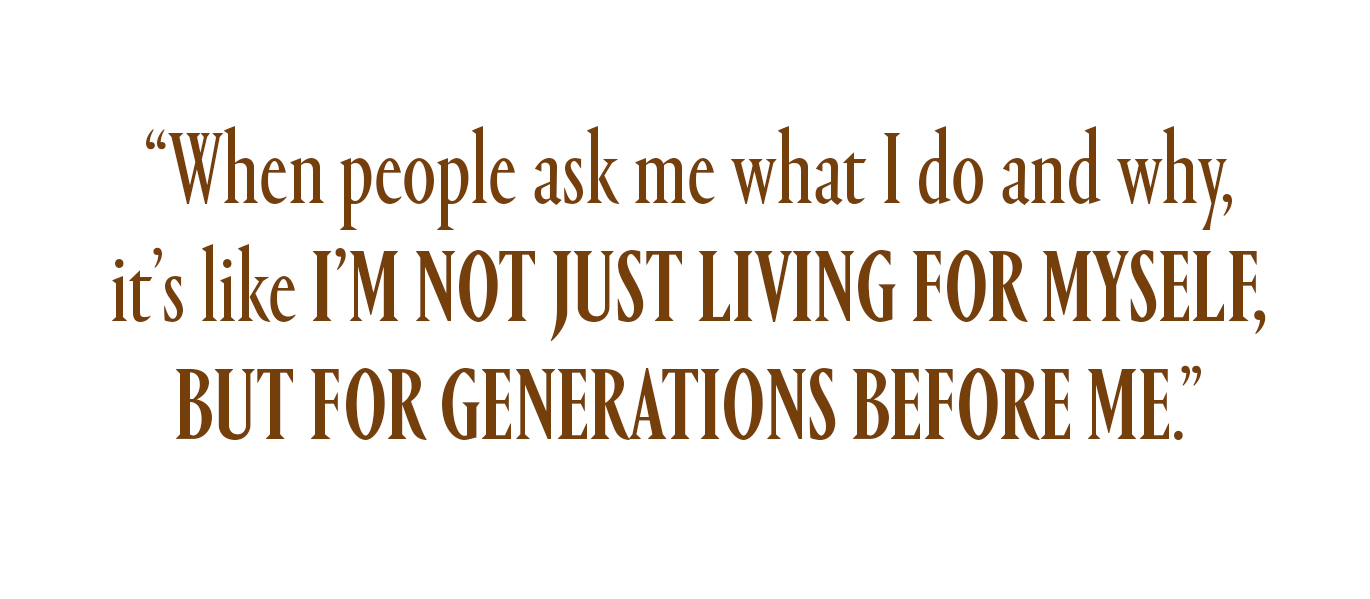
The day before the game, Wilson is in a quieter Arena (those who know call it the House), situated on the edge of the monstrous Mandalay Bay Resort & Casino and the I-15 freeway, for a two-hour team practice. She only arrived back in town at 1 a.m. that morning after traveling to Phoenix to take on (and defeat) Brittney Griner’s Mercury.
As Lil Wayne’s “6 Foot 7 Foot” plays in the background, Wilson shoots around. On the beat, Wilson hits a jumper. And I call it like I see it, and my glasses on. On the next verse, she sinks a three. But most of y’all don’t get the picture ‘less the flash is on. The song wraps, but Wilson keeps shooting, creating something of a rhythm of her own. From the key, the wing, the corner: Swish, swish—swishhhh.
After running a few plays, Wilson and her teammates gather in a circle at half court and begin dancing. Hands on their knees; bodies dripping and dropping. They break to take a few shots from center court. On her second try, Wilson makes it from the long range and runs towards the tunnel in victory, laughing and smiling. The playfulness is justified, if perhaps unexpected, since anyone reading stories about women’s basketball are told of a sport writhing in drama.
There are the thin plot lines of veterans being jealous of rookies; the unimaginative examinations of every play and whether it was too rough, most of it coming from ill-informed male sports analysts. The worst of the commentary tinged with racist and sexist undertones.
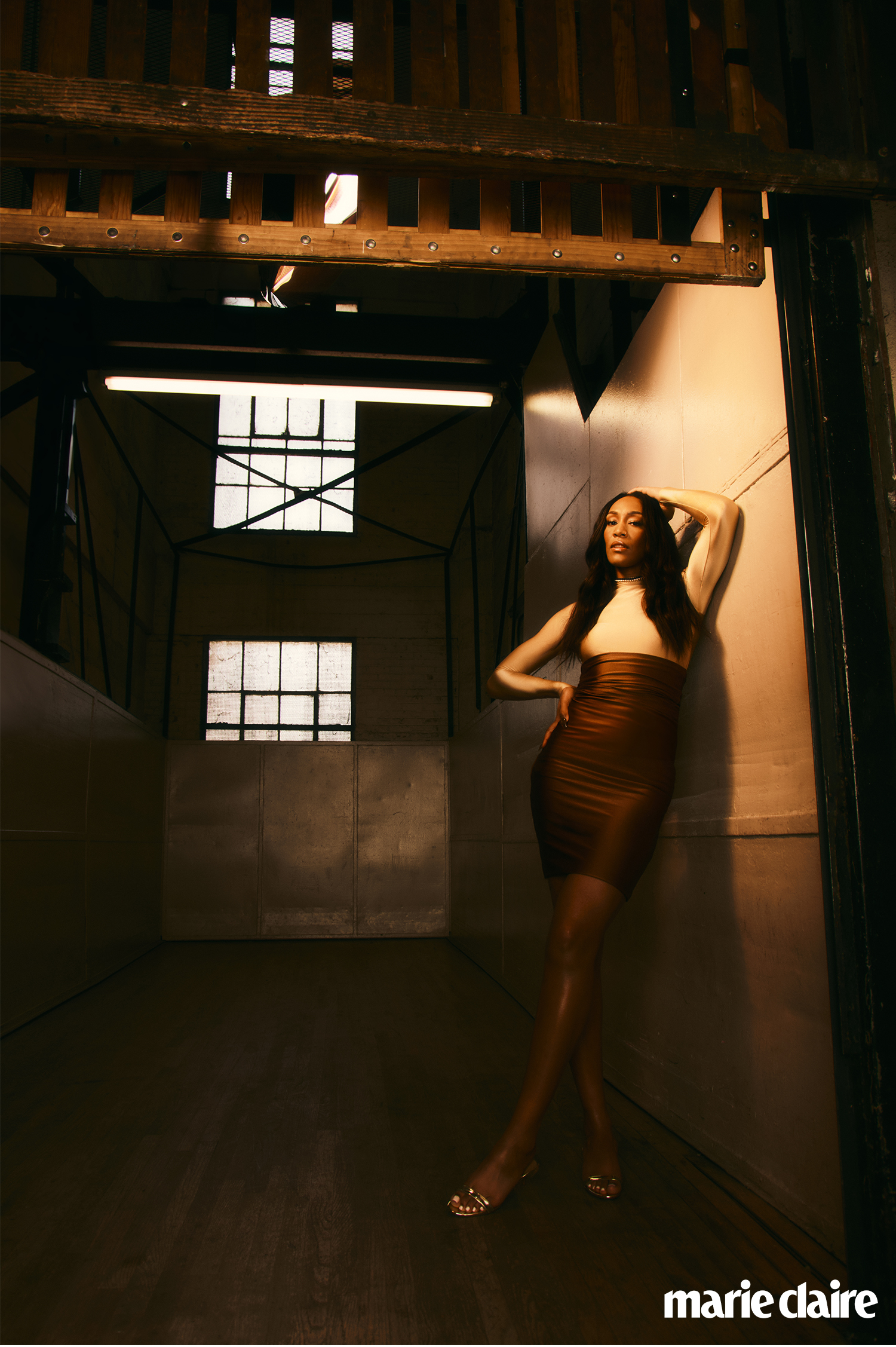
Sportmax top and skirt; Aquazurra shoes; Cartier jewelry
It’s one of the first things that comes up when Wilson and I sit down to talk. We’re in the belly of the stadium, in a windowless room where something like a banquet is being set up. Workers move in schools, quietly positioning two-top tables and spreading out black tablecloths. Wilson walks in after having just finished practice. She’s kickbacked and casual in soft gray shorts and an olive green sports bra. Her big, easy smile breaks into a little laugh when the topic of physicality of play between women on the court comes up. “I’ve been getting my ass beat for eight years,” she says, with a tone of both exasperation and amusement. “I’m just like, okay, we have to start from ground zero and hold these people by the hand and talk to them like they’re toddlers. This is a physical sport. I know you think I’m a lady and that I cannot fight and get down and gritty in the post, but I can. It’s my job and I love what I do.”
She pauses briefly, before turning a bit more serious: “Now that there are more eyes, I feel like it’s gotten a lot more dramatic. I feel like it’s been a lot of gossipy [stuff] and it’s taking people away from the product that’s on the court.”
Wilson’s talking, in part, about the so-called rookie rivalry. A beef that in her mind is completely manufactured. “We have all been rookies before, so why would I hate on a rookie class now all of a sudden? I’ve been in that same spot. I’ve been in that heat, I’ve been in that seat,” says Wilson, 27. “So for me, as a veteran, to hear that there are these men talking gibberish and garbage and trying to pit us against each other, it really kind of stung me a little bit.”
Jackie Young, a teammate of Wilson’s since 2019, remembers how Wilson “took me under her wing” when she got drafted. “She showed me the ins and outs and what to expect,” Young tells me as she’s riding in a bus on the way to an away game. “My first couple of years in the league, it was rough for me, and she was by my side. She didn’t have to do that. She has the weight of the world on her shoulders, but the way she shows up for us every day is something to appreciate.”
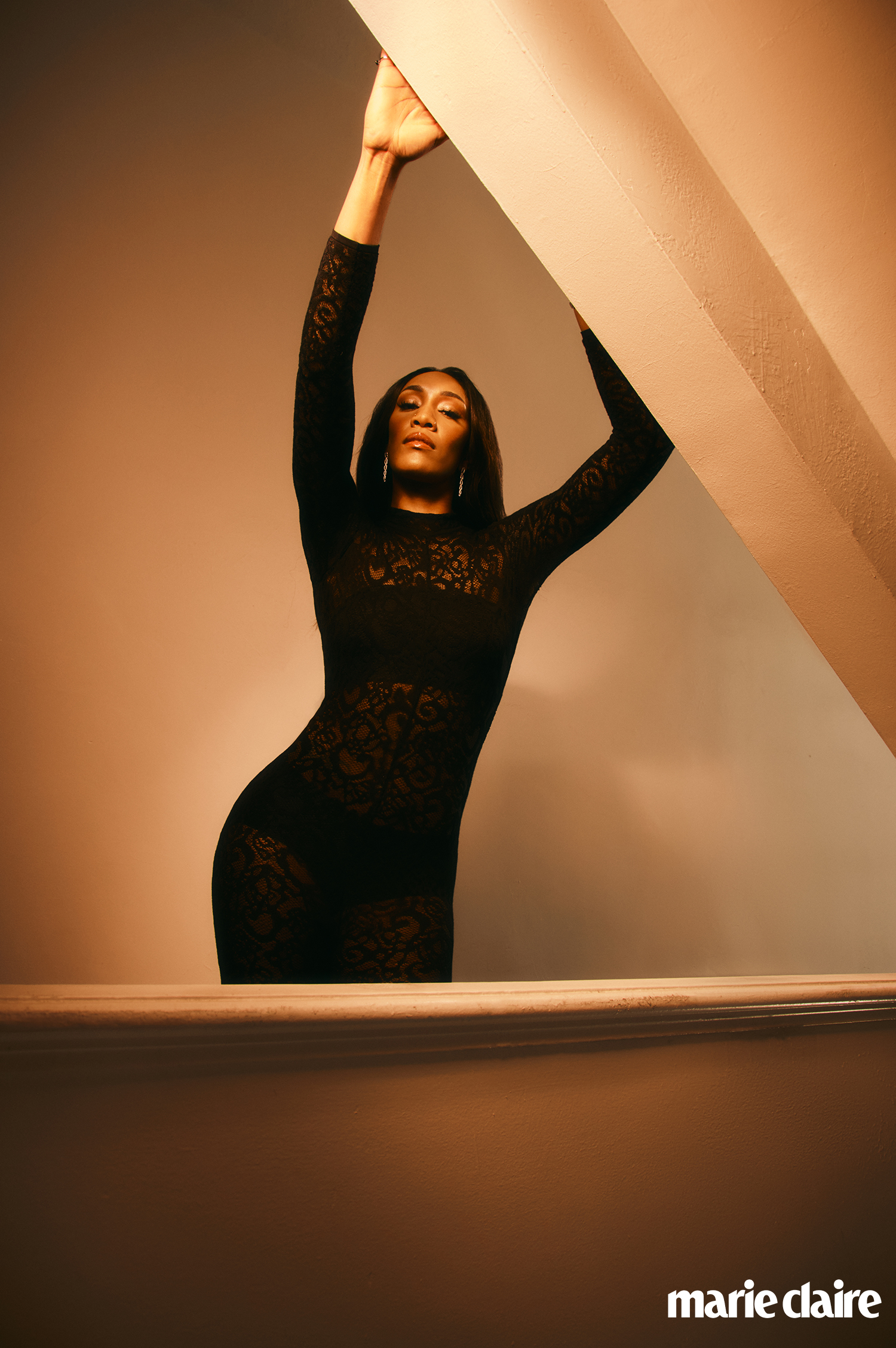
Moschino jumpsuit; Bulgari earrings
When Wilson came to the Aces, she didn’t have that. Everyone was new, from the coaching staff to the front office. “I try to make sure I’m the vet that I didn’t really have,” she says. “The guidance is needed, particularly now, because there’s so much noise.”
Her stats cement her as a great basketball player, but it’s this—her leadership and what she ignites in others—that will make her legendary. “[A’ja’s] able to wear so many different hats, but the core of who she is is this little girl that had a basketball placed in her hand, and that has allowed her to travel the world, to meet unbelievable people, and to impact lives,” says Nikki Fargas, president of the Las Vegas Aces. “That’s who A’ja is. She is us, and we are her. And that’s for all of those who have been faced with discrimination, who have been faced with harassment, who have been faced with unfair judgment. She carries that for all of us. You have those who break barriers, like the Jackie Robinsons of the world, and I think A’ja has done that. Her achievements break barriers. They challenge stereotypes, and she has paved the way for progress towards equality.”
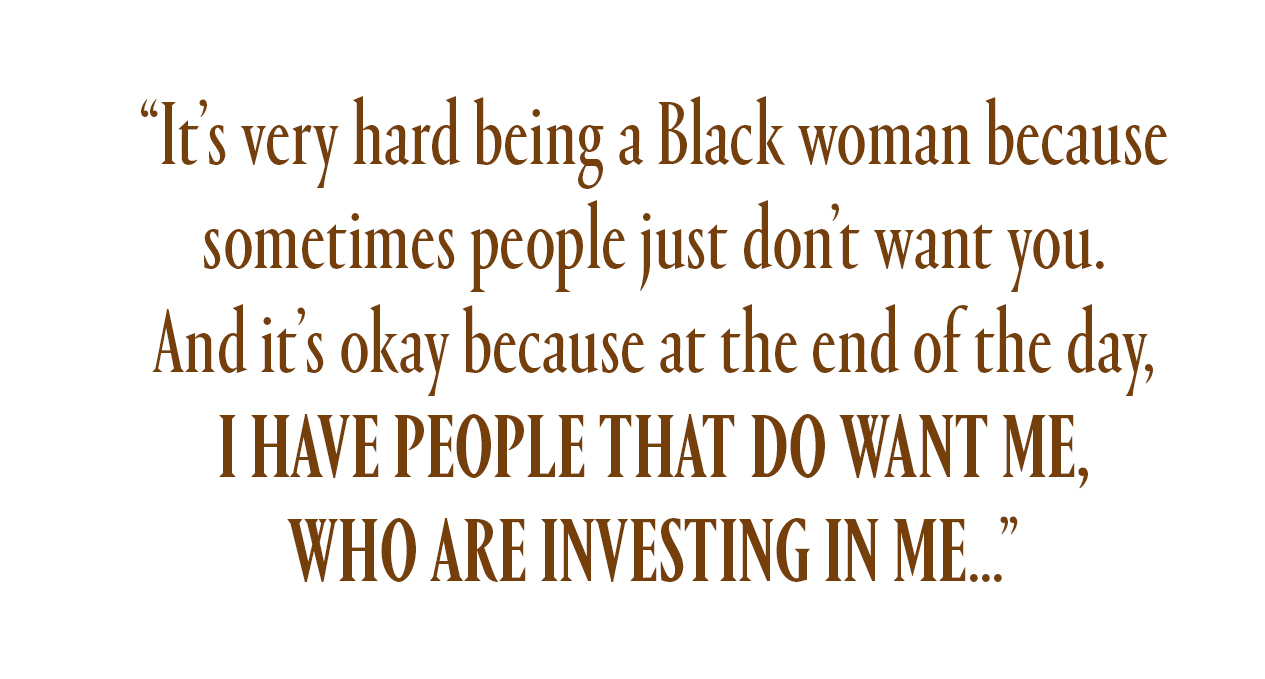
Fargas speaks of Wilson as if describing a scientific state, as something both defined and in evolution. “She’s the nucleus of this league,” Fargas says. “There’s a lot of great players in this league. There’s a lot of great players who came before her [Wilson] and a lot of great players that will come after her. But right now, in this era that we’re in, she’s the most dominant women’s basketball player in the world.”
Which makes it even stranger that Wilson’s name isn’t always dropped in larger conversations about the rise of women’s basketball. Last year, she came in third place for MVP, after receiving a fourth-place vote, which she admitted at the time “hurt like hell.”
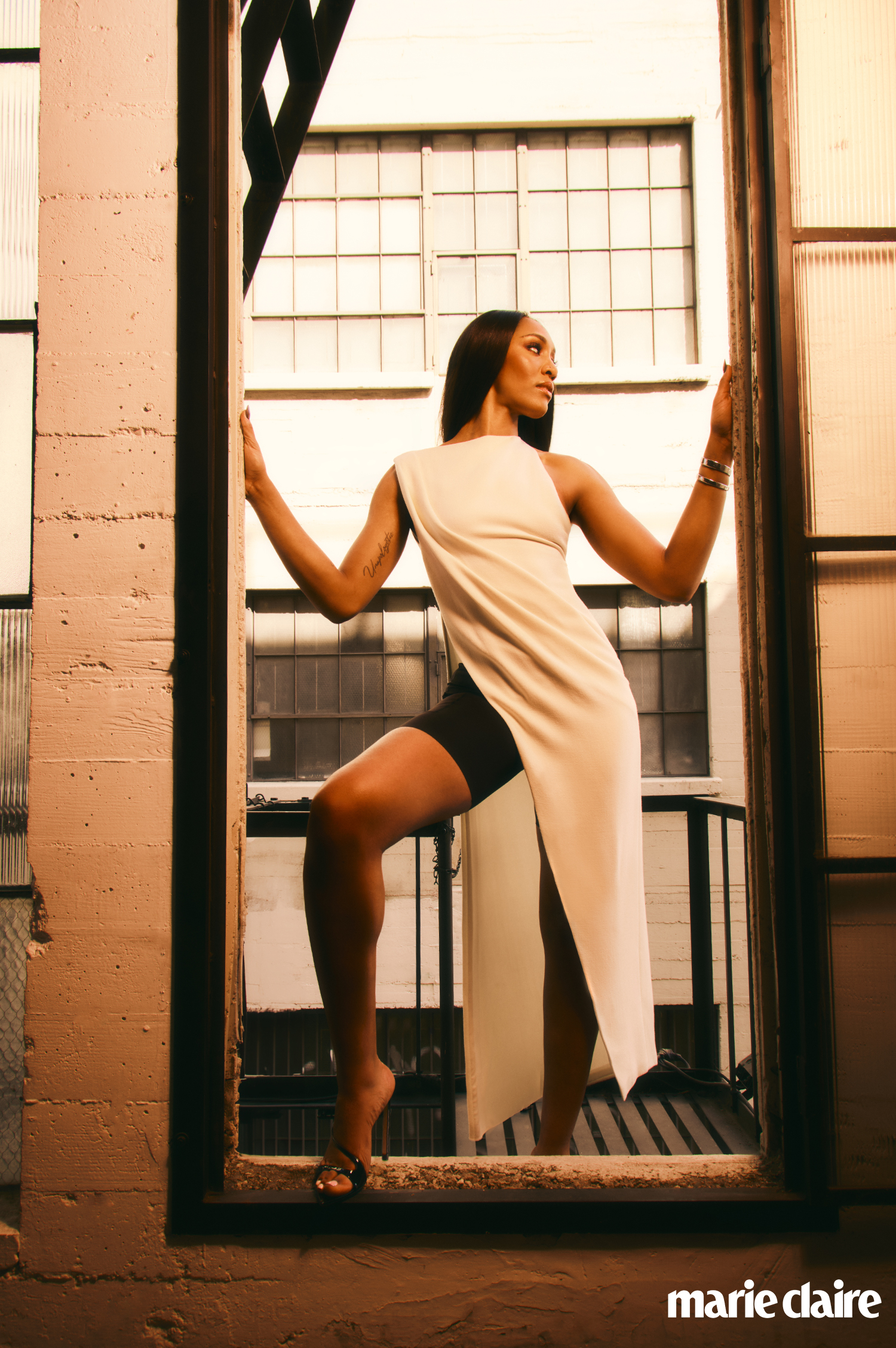
Brandon Maxwell dress; Nike shorts; Bulgari watch
“I felt like I was mentally tired in that whole whirlwind of people constantly saying, ‘A’ja you’re only known because of Caitlin [Clark]; we’re only here because of Caitlin,’” Wilson says. “And that’s great, I get that, but while you’re here I’m not going to let you discredit me or the work that I’ve done, or my teammates or the people who came before have done.”
It’s something often missed in the hot takes around women’s basketball: that the show we’re all glued to is the sequel. Women’s basketball has been this good. Look at Sheryl Swoopes and Candace Parker and Cynthia Cooper with her legendary pick-and-roll.
Look at Wilson, the Aces supernova center.
Andraya Carter, who played against Wilson in college and now works as a host, analyst, and reporter for ESPN, tells me: “A’ja’s greatness, in spite of people, at times, refusing to recognize how good she is…[she’s] still prevailing and persevering and coming out on top. It’s frustrating at times to try and pivot conversations back to [her], which I’ve found myself doing…[Because] the hottest topic to me is the best player in the world that people do not have an answer for season after season.”
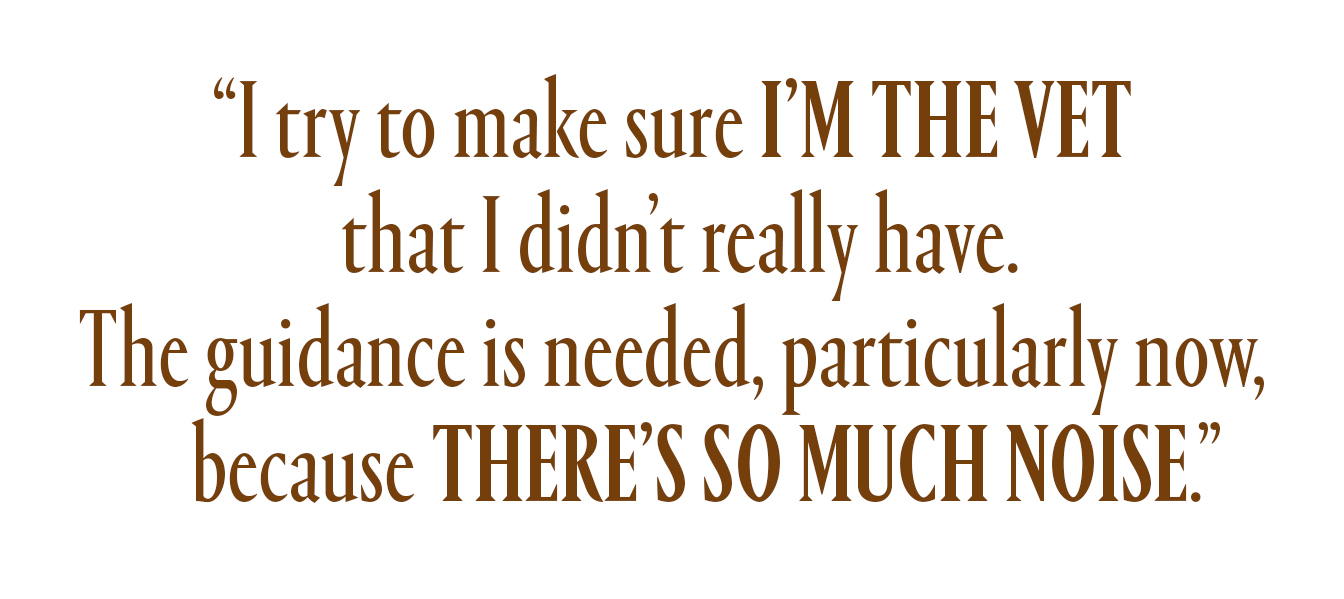
At Heathwood Hall Episcopal School in Columbia, South Carolina, Wilson wasn’t even good at basketball. She didn’t like to sweat, and unlike the modern sports machine that begins molding children into pro athletes at a young age, she wasn’t one of those knee-high phenoms dedicating all her free time to playing on a team. She’s six-foot-four now, but back then she hadn’t had her growth spurt yet. She didn't stand out.
Around eighth grade, her dad told her she had to do something and handed her a basketball. At team try-outs, she remembers sitting in a cold gym, mostly observing other players running drills, while she didn’t even know how to dribble a ball. As Wilson tells me, she was “awful” at the sport; a “late, late, late, late, late bloomer.” To her surprise, she made the cut, and when it was her turn to pick a jersey, she knew enough to stay away from the hallowed No. 23. Only good players were worthy of being that close to Jordan’s orbit of greatness. Instead she chose No. 22, which would become a symbol of greatness all its own.
But that’s yet to come.
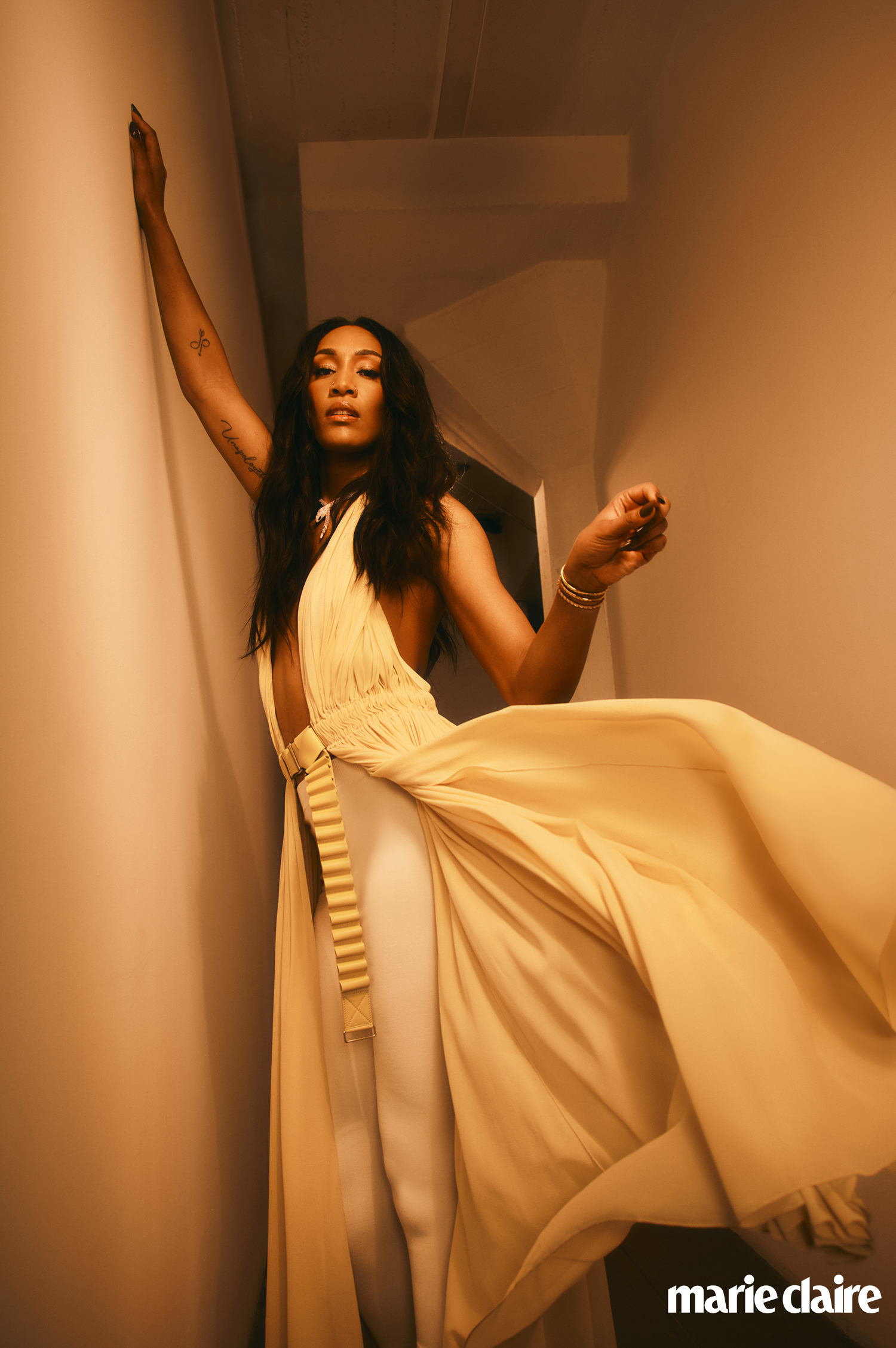
Louis Vuitton dress and leggings; Bulgari jewelry
In those days, Wilson sat the bench and handed out Gatorade to her teammates. “I was just happy to be there,” she says. Once, when she finally got to play and was passed the ball, she ended up going in the wrong direction. “I had to play on a co-ed team because I was still young and it was never all girls, and I remember I had my first awful scene when I dribbled in the wrong direction,” Wilson says. “It was my big moment and I was like, yes, they finally passed me the ball, and pew off I go in the opposite direction.”
The runway from subpar to superstar was short, though. When her middle-school team won the championship, and she held the trophy up in the air, something shifted. She understood what it felt like to win and it was intoxicating. Suddenly basketball was on every TV in the house. Wilson practiced in the front yard for so long into the night, she relied on the headlights from her parents’ car until the battery died. She used her mom’s flower pots as defenders. In the aquatic air of the South, Wilson’s movements became fluid—a perfect flick of the wrist, her body hanging off the ground as if the heavy humidity were holding her up.
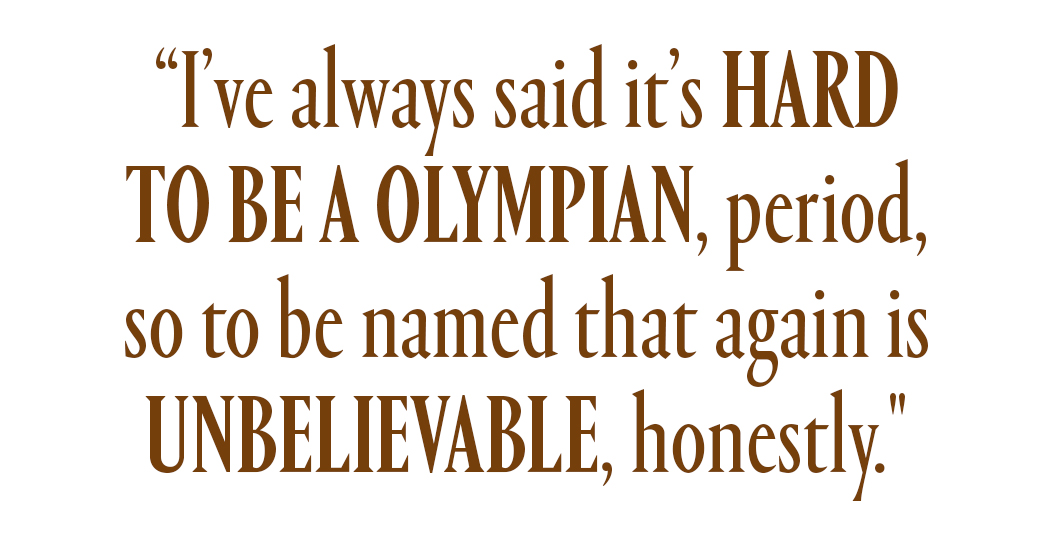
It strikes me that while certainly Wilson’s talent seems to come from a metaphysical place, this is part of it, too. That Wilson never had to live up to the expectations of fulfilling the prophecies of being a rising star, at least not in those early, delicate days. When she arrived on the scene, she was already realized. The love of basketball in her bones.
As a teen, she began playing on AAU teams and securing spots at high-level, invitation-only basketball camps. Things got more intense, but her parents—Roscoe Wilson Jr., who played basketball in college and professionally overseas, and Eva Wilson—kept her balanced. “My dad was like, ‘A’ja get your ass in that gym and don’t get out until you make a thousand shots under a minute’ and my mom’s like, ‘Hold up, she’s about to go to prom and has hair and makeup in the bathroom right now,’” Wilson says.
She was also close to her grandmother, Hattie Rakes, whose name is tattooed on her arm. At Hattie’s house, it always felt like Sunday—easy, slow, simple—which meant Wilson could escape the sport whose pressures were creeping closer in. Already people were starting to take notice of her, but at Hattie’s she could just be A'ja, not A'ja the Athlete.

Saint Laurent dress and stole; Bulgari necklaces and ring
High school hoops eventually led to the University of South Carolina, where Wilson played for the Gamecocks. She led the team to their first ever championship, and it was there she met her mentor Dawn Staley, coach of the women’s basketball team. Staley is the person who keeps it real with her, no matter what, Wilson tells me.
Staley calls me at 7:30 on a Friday morning and says she wasn’t sure back then if Wilson had what it took to make it. Certainly she was skilled, but to go pro is all so tenuous. But these days, “I’m proud,” Staley says. “Sometimes you put the work in and you don’t always get the results that you want. But with A’ja, she’s forcing the results…There’s no doubt who the best player in the world is.”
!["There’s a lot of great players who came before her [Wilson] and a lot of great players that will come after her. But right now, in this era that we’re in, she’s the most dominant women’s basketball player in the world.” — Nikki Fargas](https://cdn.mos.cms.futurecdn.net/q2FUm5wFDbL9USLs6izCT4.jpg)
Playing at the University of South Carolina meant something on a deeper level to Wilson. “When people say, ‘I’m my ancestor’s wildest dreams,’ I live that,” she says. “I’m a product of a Jim Crow era. My grandmother couldn’t walk on this campus. My dad couldn’t play for the University of South Carolina Gamecocks. He had to go to an HBCU up the street because he couldn’t go to that school. So to have his daughter be successful there?"
In January of 2021, the school put up a statue of Wilson to honor her accomplishments. And it’s this, more than anything else that she tells me about with a real sense of awe at what she had accomplished. "When people ask me what I do and why, it’s like I’m not just living for myself, but for generations before me.”
Wilson’s arrival to the Aces signaled a shift in the dusty Las Vegas basketball scene: they began winning. “She is the nucleus of this league,” Fargas says. “Right now, in this era, she is the most dominant women’s basketball player in the world.
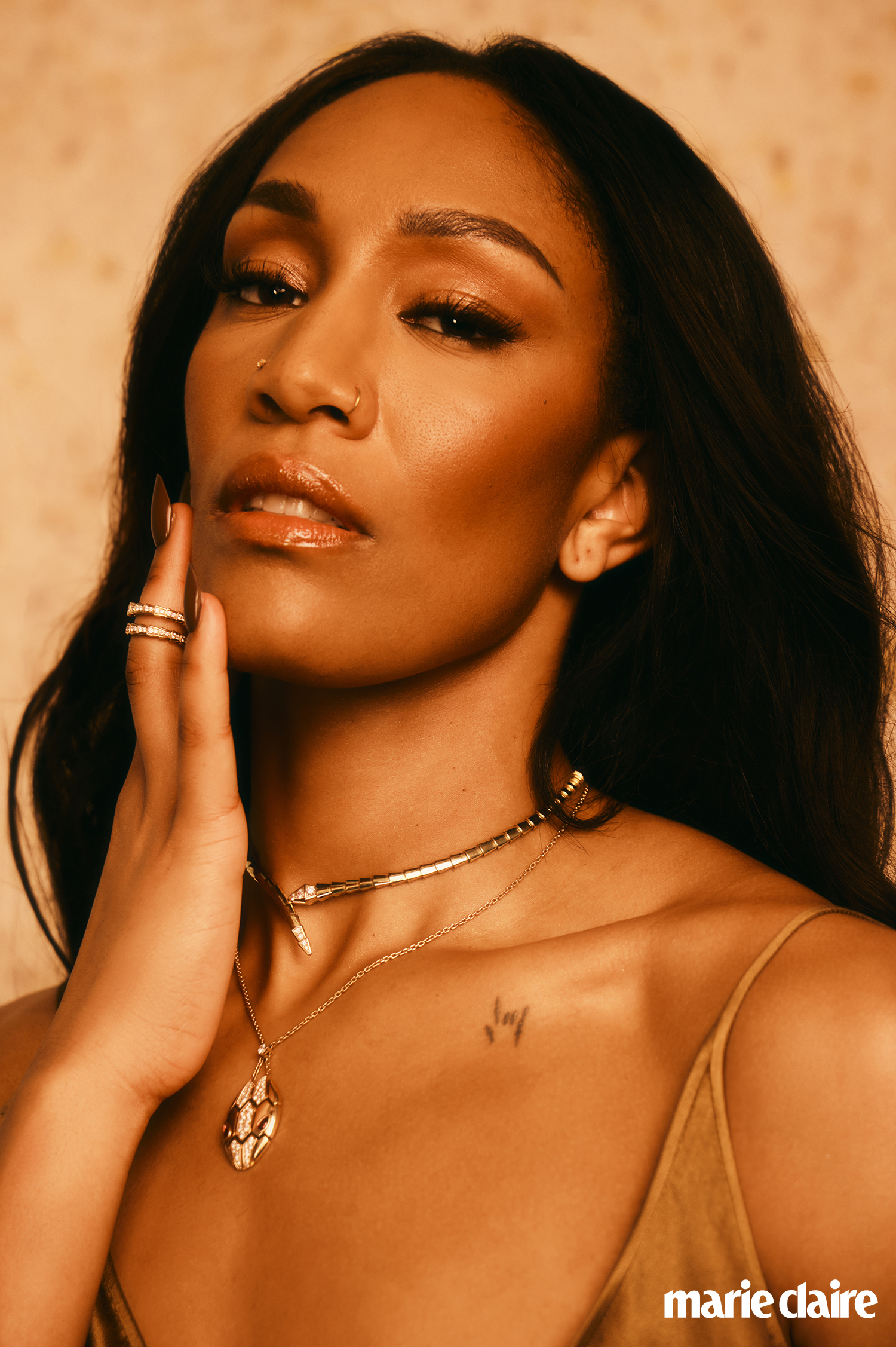
But success arrived as an unexpected challenge. “Everyone talks about not wanting to fail, but it’s kind of like you also have to be scared of success,” Wilson says, leaning back in her seat. “On the success end, it’s very lonely. You’re very by yourself because it takes a lot of hard work and consistency to get up there. So you may be up there by yourself and it’s kind of like, Who do I turn to? You have that sense of anxiety and you want to be perfect and you want to be great. [People] look at your banners, they look at your rings, they look at your resumé, and they think you have everything. And those are the times when you’re like, I need someone the most.”
It was 2020 when Wilson really began to feel that, emotionally and mentally. “My mind would not settle down for nothing,” she says. “I was just like, basketball used to be my outlet…My mind was rattled. I never felt like I was at peace with myself and I lost myself in that and started to get sick. I started to get anxiety attacks.”
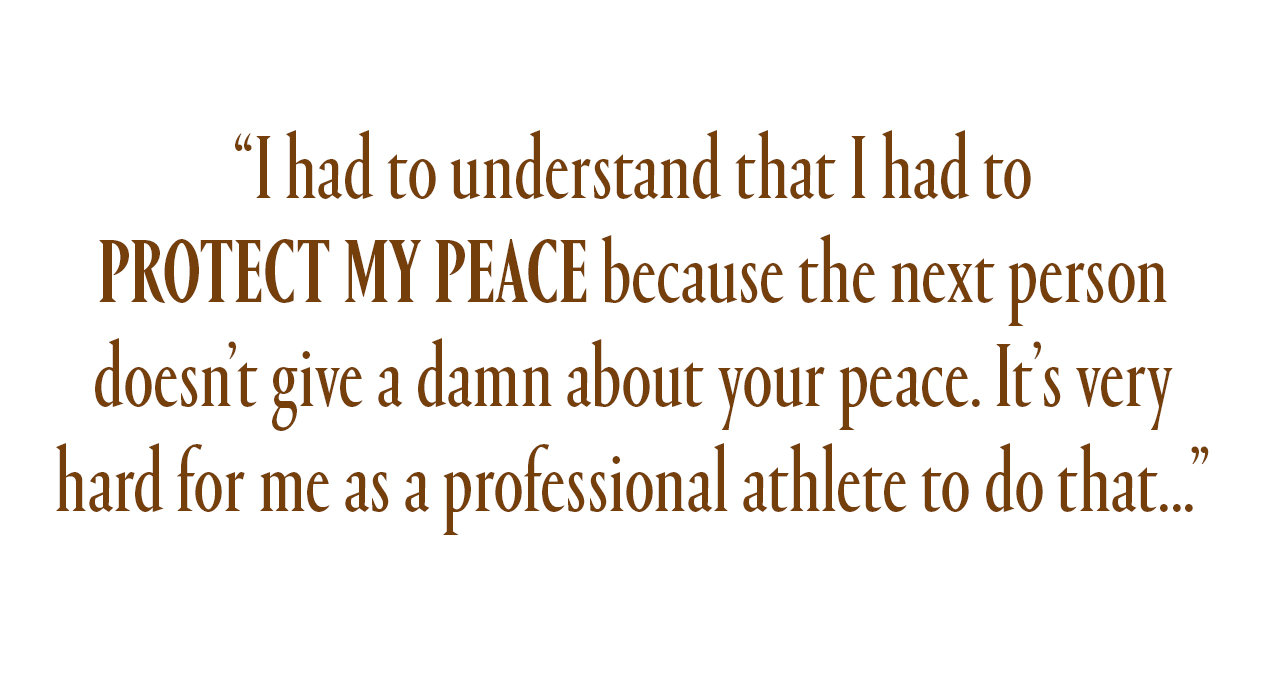
She adds: “I was like, I can’t do this anymore. You grow up your whole life and [everyone is] like, ‘Never say you can’t; never say never.' Can’t was not in my vocabulary, but in some cases, it’s going to have to be okay to say, I can’t do this right now.”
And so she didn’t. She prioritized getting sleep. Gave herself permission to not be the first one in the gym and the last one to leave. “I had to understand that I had to protect my peace because the next person doesn’t give a damn about your peace. It’s very hard for me as a professional athlete to do that because I want to be that person for everybody,” she says.
Wilson thinks the rising interest in women’s basketball is great, don’t get her wrong. “It’s like, New fans, welcome! Hello, I’m glad you guys are here! Take a seat, grab popcorn, because you’re in for a ride,” she says.
“I feel like it’s just one of those things where you go back home and you have a hole in the wall [restaurant] and you’re like, Oh my God, I love this place, I know I can always go there and they know my order,” Wilson says. “And then all of a sudden this influencer goes there and is like, ‘Try the chicken tenders.’ And now the next time you go it’s flooded with people. It may be a lot of commotion…but at the same time, you’re so glad they’re getting this business.”
Because yes, basketball is a business. And to get the changes that Wilson knows are still needed—the endorsement deals, the eye-popping contracts, the charter flights and private security—it’s going to take fans, the grease to bigger money and investments.
When Wilson talks about changing the game this is what she means. It’s why her rookie year, she called out the pay gap in women’s sport on X (then Twitter) after Lebron James signed a whopping new contract: “154M….must. be. nice. We over here looking for a M [upside down smiley face] but Lord, let me get back in my lane,” she wrote. (Later, in an Essence article, James called Wilson the “Rookie With a Voice.”)
Wilson may have those shiny endorsement deals now—with AT&T, Gatorade, NBA2K, Carmax, and others. But it wasn’t always that way. “I think it’s a tough situation to be in and particularly, once again, it’s very hard being a Black woman because sometimes people just don’t want you. And it’s okay because at the end of the day, I have people that do want me, who are investing in me, partnerships that are wanting me to grow and are allowing me to be me.”
One of those partnerships is expanding: In May, she announced the launch of her signature collection with Nike, which includes her A’One shoe and apparel line. After working on it for nearly two years, it will be out in 2025. She can’t share details for what it looks like just yet, but teases, “There are Easter eggs in the shoe; you just have to find them…little sneak peek-a-boos to really just make it signature me. Know that there is a piece of me with you.”
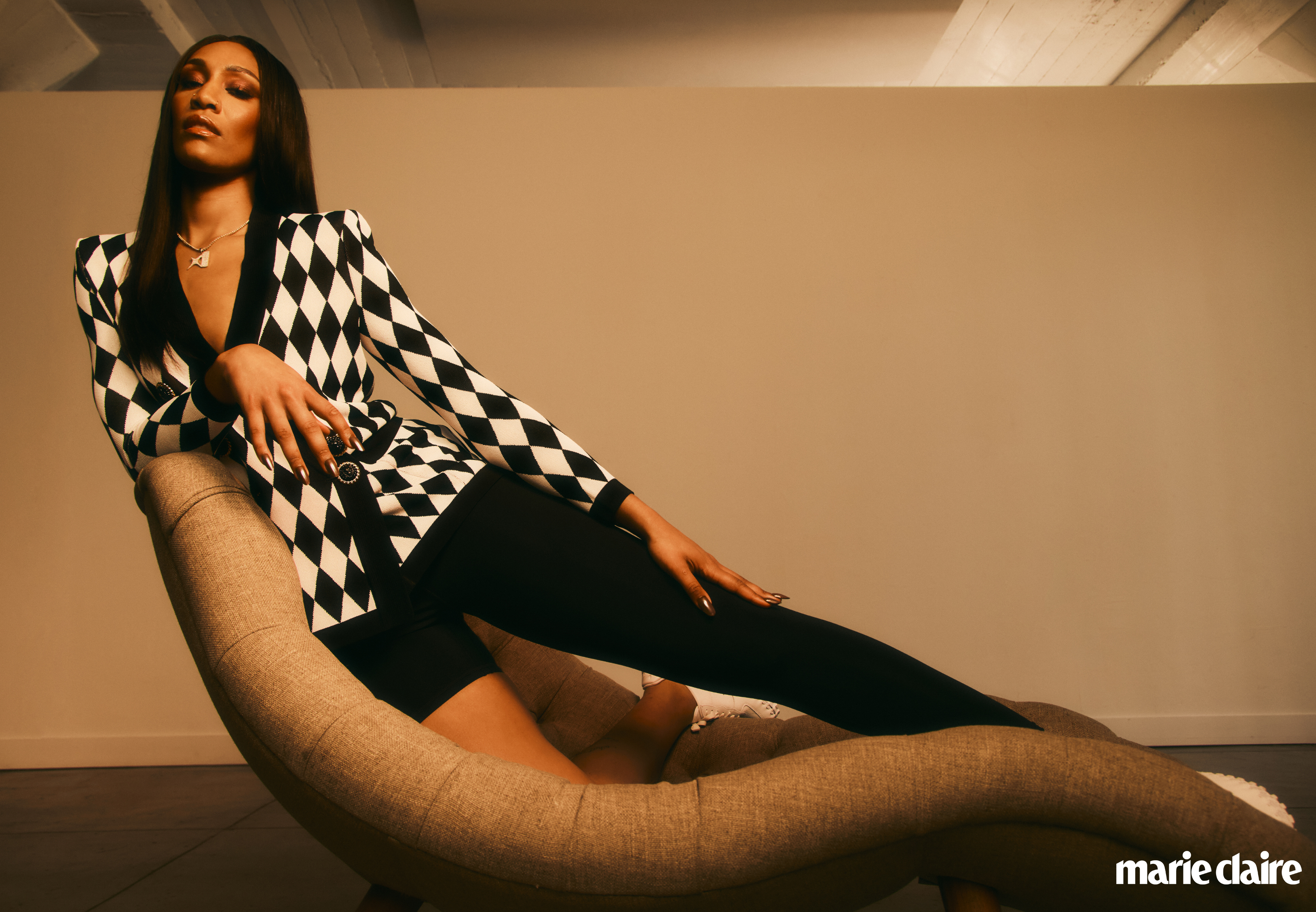
Balmain top; Nike A’ja Wilson Signature Collection leggings; Talent's own necklace
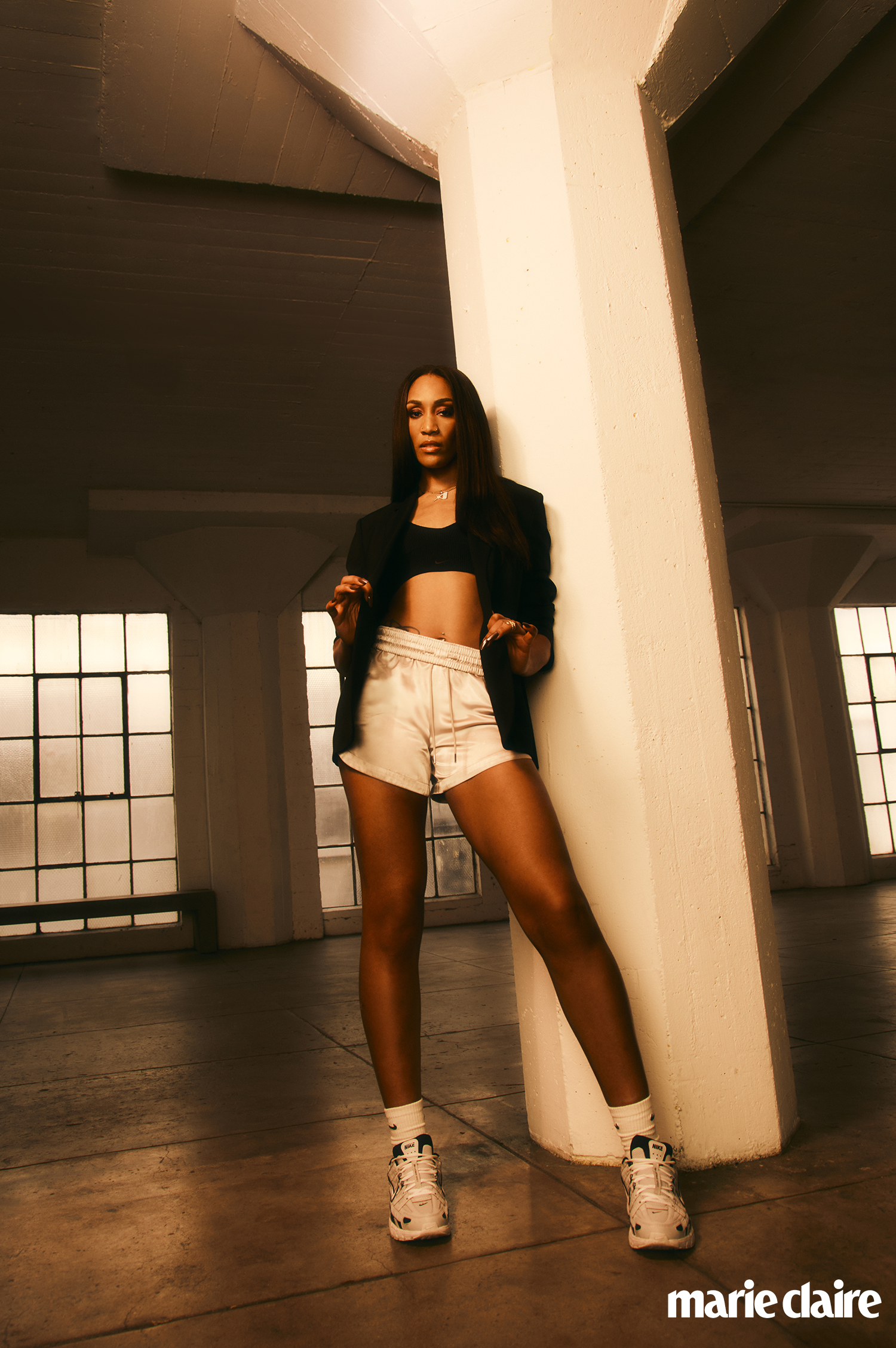
No. 21 blazer; Nike A’ja Wilson Signature Collection shorts; Nike bra, socks and shoes
Ask around, and you get the sense that Wilson is just getting started. “I see a future of great success and achievement,” Fargas says. “I really think that A’ja—I know this sounds crazy—but I think she is just now peaking.”
This year, she’ll head back to the Olympics for the second time. “Man, it’s huge,” Wilson says. “I’ve always said it’s hard to be a Olympian, period, so to be named that again is unbelievable, honestly. I called my parents and was just as happy as I was the first time.” Quite a feat for a kid who had an Olympics-themed birthday, challenging her friends to competitions on Wii Sports.
Certainly Wilson has the talent to keep reaching new heights, but Fargas is talking about the intangibles. The style of Wilson’s play. The effervescence feels a necessary ingredient for longevity, both physically and just in the sense that Wilson seems down to stick around.
“It feels like artwork to me when I watch A’ja,” Carter says. “She has joy, which as someone who truly struggled with wanting to be perfect and stressing over basketball, and it feeling very heavy for me, it’s my favorite thing about watching A’ja play—it doesn’t look heavy; it never looks like a burden to be out there.”
Wilson doesn’t lack the work ethic, focus, and grit that it takes to be a competitor (Fargas describes her as a “tiger” on the court), but her ability to have fun with it feels hyperdimensional. When you’re on a different plane, well, why wouldn’t you smile?
Photographer: Chrisean Rose | Stylist: Annina Mislin | Hair Stylist: Kiyah Wright | Makeup Artist: Autumn Moultrie | Manicurist: Kimmie Kyees
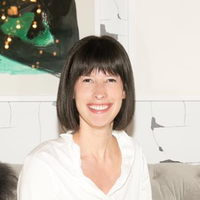
A former features director at Cosmopolitan, and the current executive editor of Marie Claire, Andrea reports on politics, people, culture, social trends, physical and mental health, and more.
